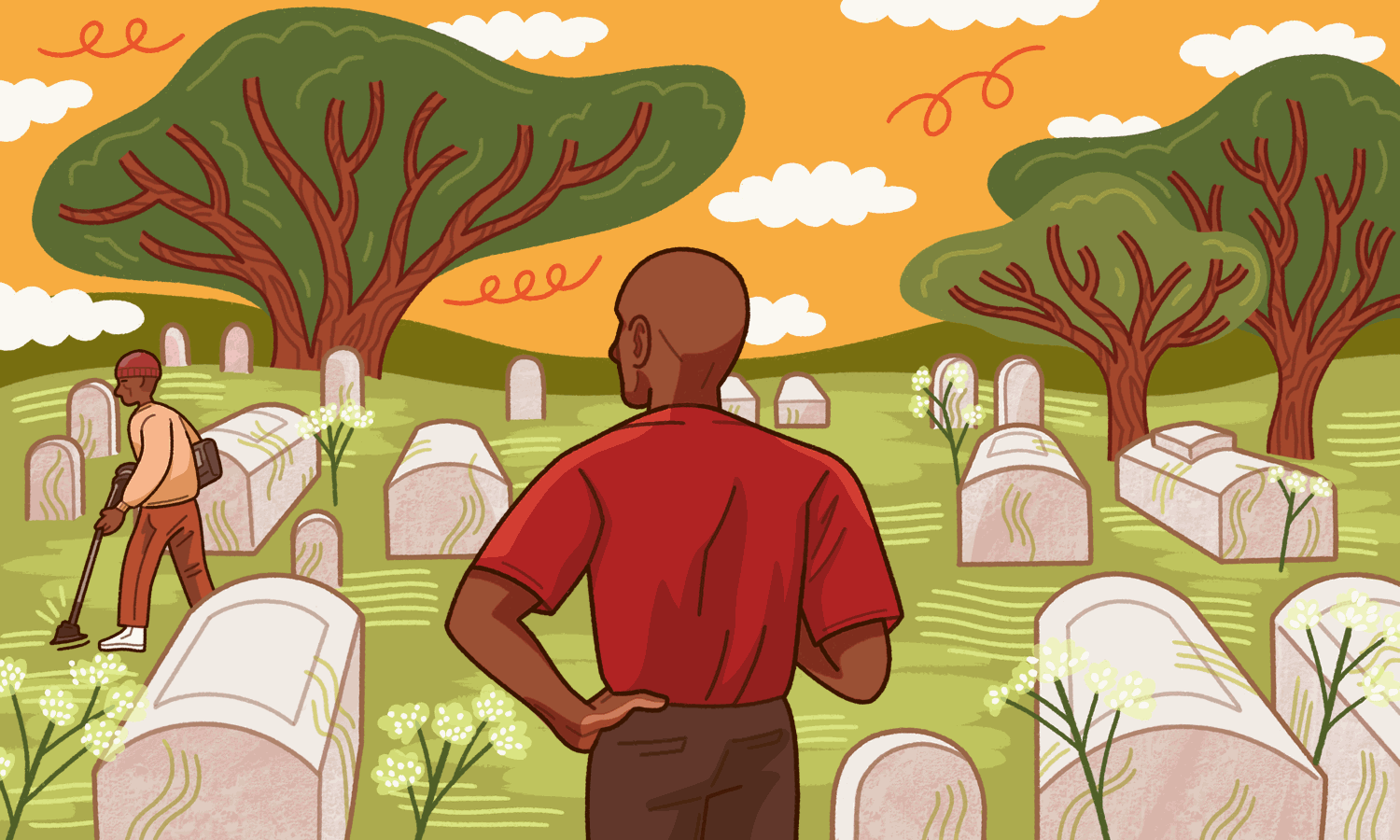
LAUREN IBAÑEZ / NEXTGENRADIO
What is the meaning of
home?
Victoria Fonseca speaks with Miami native Frank Wooden, who has dedicated his time to preserving the historic Black cemetery, Lincoln Memorial Park, in Brownsville after his brother bought the land where their parents are buried.
To Frank Wooden, Lincoln Memorial Park is more than just a burial ground
Listen to the Story
Click here for audio transcript
Audio Transcript – Frank Wooden
My name is Frank Wooden. I work at the Lincoln Memorial Cemetery as a caretaker. My mothers here, my fathers here, my sisters here, my brothers here. So I feel like when I come in here, I’m coming home again. I’m not gonna see them in the physical but I can feel their spirit. And it makes me happy to come to work every day. Sometimes I come seven days a week, just to come out here work, get it cleaned up. The weeds, the grass that grows up between the graves, I weed eat it.
Sound of a weedwacker
I come to work in the morning, we open up at 10. But sometimes I get in at 8 to get a head start. Now we’re going to put an 8-foot foot fence around here, gonna put some lights on the inside and we’ll have a sliding gate up front. We’re gonna paint the driveway, we’ll paint the tombstones. We usually use the white paint we got or if a family member might want to bring some other color paint that they want to use for their loved one. They’re gonna be beautified.
It’s a Black cemetery and it’s historical. That’s a good feeling, you can look to the left, you can look to the right, all the way down to the back wall, you see a number of caskets. We got the soldiers in the back, and so we try to bring the history back to the neighborhood and to the public. Kids can come and visit, students can come and visit and just lift the neighborhood up. People can come back and see their relatives once again.
That’s why I love my brother Jessie Wooden. He purchased it from the young lady that had it. We got a couple of our nephews and cousins that work with us out here. It’s about five of us total working at Lincoln Memorial Cemetery. We do the work of 100. We will do our best to help him keep the graveyard going. Whatever we got to do, we’re gonna break our back to get it right.
I grew up in Miami. Born and raised in Overtown. That’s another Black spot, Overtown. Now they call it Wynwood. Stayed a few years out here, too – Brownsville, Carol City, Liberty City. My father, we moved around. Thirty one kids my father had. Yep. And I got 15 kids of my own. Eight girls and seven boys.
I have 36 grandkids. I got nine great grands. If I have them on the weekend with me, I bring them. I take them to my mother’s grave, my father’s grave, my sister, my brother and my aunt. After that. I let them ask me questions. Sometimes they go, ‘Grandaddy why grandmomma over here and granddaddy over there. I say, ‘Because that’s where their laying place at.’ So that’s how they learn.
Sometimes I’d rather be here than be home with them.
My parents were lovable, kind, peaceful.
My mom had me in the kitchen at 8, 9 years old washing dishes, learning how to cook. So, that’s why I love cooking so much.
Before I became out here to help my brother. I was working on a food truck. We serve frying fish, frying chicken, collard greens, macaroni and cheese, pidgeon peas and rice.
So I left that alone and I’ve been here ever since. That’s been now going on four years. Sometimes I stay here ‘till night. I love working out here.
That’s me, that’s what I do.
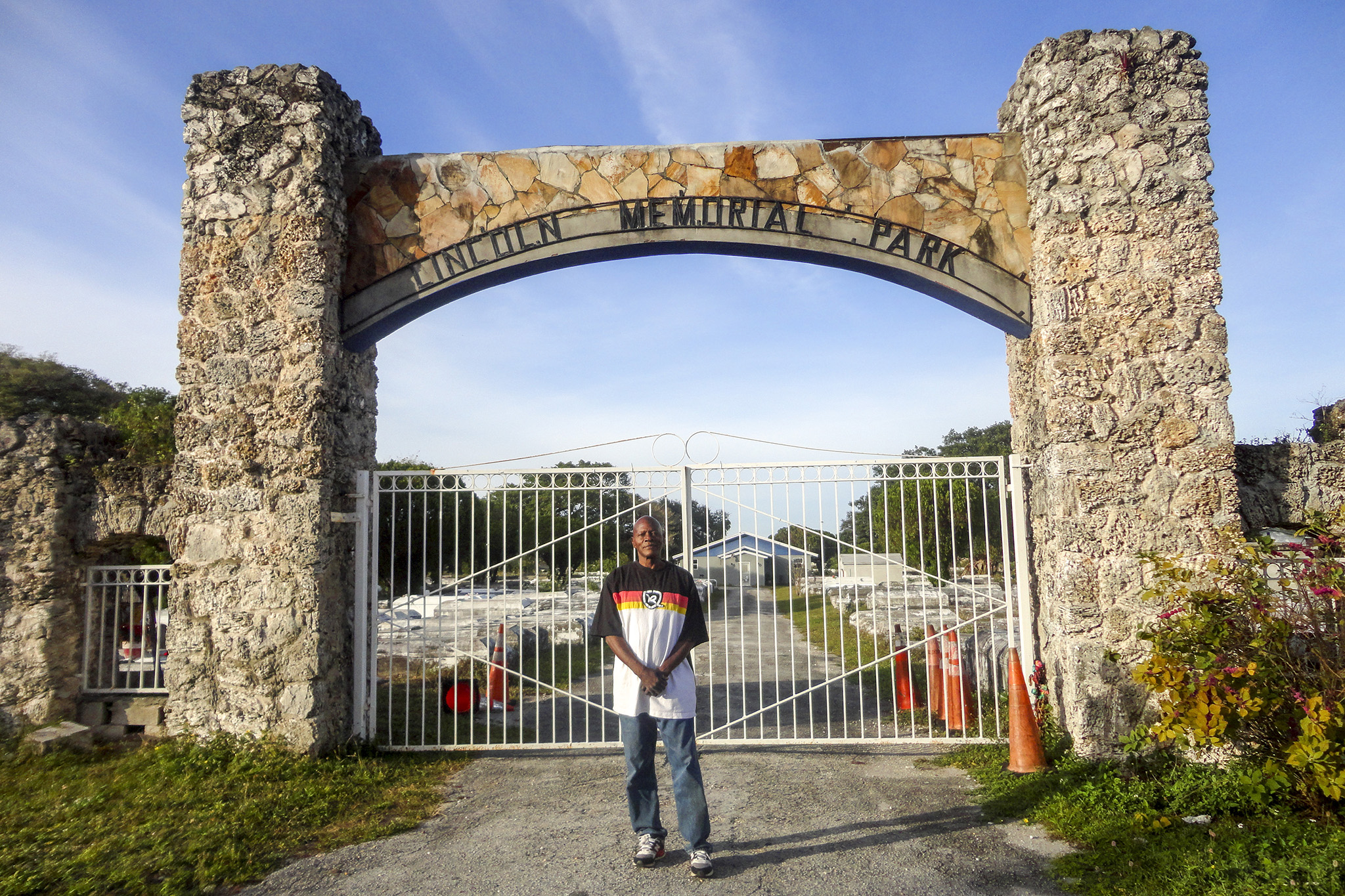
Frank Wooden, 68, works almost every day at the Lincoln Memorial Park cemetery in Miami, restoring this historic Black burial ground from the early 1900s. Jan. 2, 2024.
VICTORIA FONSECA / NEXTGENRADIO
Frank Wooden feels at home in an unconventional place — a cemetery. Not just any cemetery, but Lincoln Memorial Park, a historic Black burial ground in the city of Miami.
Wooden, 68, is a former food truck cook who grew up in neighborhoods near the cemetery. Throughout his life, he has seen the city evolve. He doesn’t want anything to change about this plot of land, where he works as one of its caretakers.
“When I’m coming here, I’m coming home again,” said Wooden. “I love working out here. That’s me. That’s what I do.” This feeling of belonging has to do with people who are dear to him; his parents, two siblings and an aunt are buried in Lincoln Memorial Park.
“I don’t see them in the physical, but I can feel their spirit, and that makes me happy to come to work every day,” Wooden said. “Sometimes I come seven days a week.”
Located in the historically Black neighborhood of Brownsville, the memorial park was first used as a graveyard in 1924. It has hundreds of tombs and gravesites, including Bahamians who were interred above ground, and many soldiers who, because of segregation, could not be laid to rest with their counterparts at Arlington National Cemetery.
Police officers were buried here, as was Dana Dorsey, Miami’s first Black millionaire, and Gwendolyn Cherry, the first Black woman elected to the Florida Legislature in 1970.
After Jessie Wooden, Frank Wooden’s younger brother, found out their mother was buried here, he decided to purchase the property in 2020 to save it from further neglect and from potential development, since it was privately owned. He convinced Wooden to come work with him.
“I love my brother Jessie Wooden,” Wooden said. “He took his hard-earned money and he purchased it. That’s why I’m here with him. We got a couple of our nephews and cousins that work with us out here. There’s about five of us total working at the Lincoln Memorial cemetery. We do the work of a hundred.”
When they got started about four years ago, many of the gravesites had been uncared for for decades. The Wooden brothers knew there was plenty of work to be done.
“We’re gonna put a fence up, an eight-foot fence, some lighting, we’re gonna pave the driveway, paint all the tombstones, and it’s gonna be beautified,” Frank Wooden said.
Wooden quit his cooking job to dedicate his days to not just preserving the cemetery, but also to restoring it. Previously, thanks to his mother, Wooden developed a love of cooking and began working on a local food truck specializing in soul food.
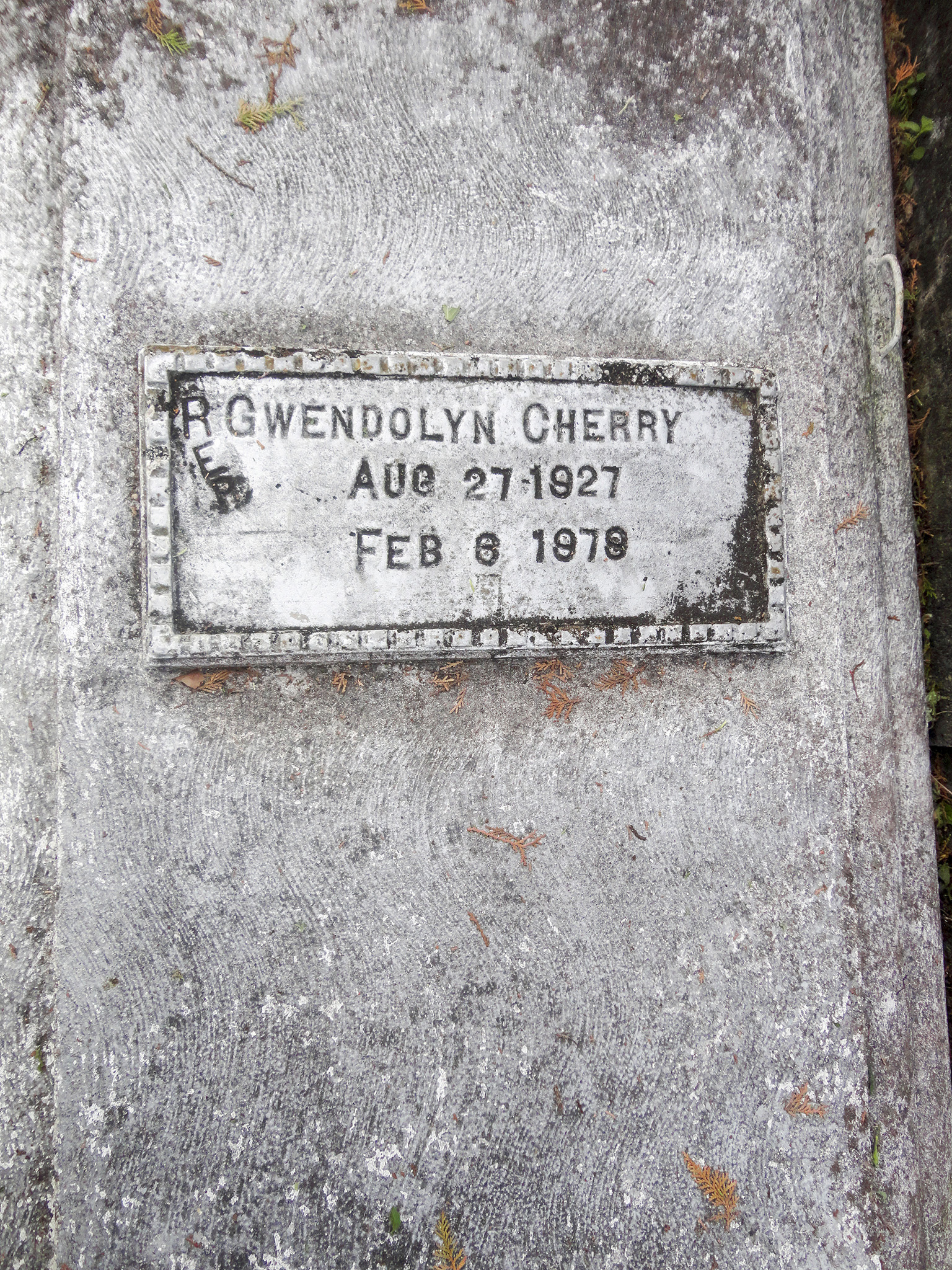
Florida’s first Black woman elected to the state Legislature in 1970, Gwendolyn Cherry, is buried at the Lincoln Memorial Park cemetery. Jan. 2, 2024.
VICTORIA FONSECA / NEXTGENRADIO
I don’t see them in the physical, but I can feel their spirit, and that makes me happy to come to work every day. Sometimes I come seven days a week.
“My parents were loveable, kind, and peaceful. My mama had me in the kitchen at 8, 9 years old, washing dishes, learning how to cook,” he said.
Most caretakers within their five-person team show up at 10 a.m. to whack weeds, shovel out the dirt, mow the lawn and blow the leaves. They pressure clean and paint the tombs. However, Wooden likes to get there as early as 8 a.m. to get a head start on his daily tasks. He stays as long as he needs to, even if it’s dark out.
“We’re trying to bring the history back to the neighborhood and to the public,” Wooden said. “Kids can come and visit, students can come and visit from different colleges and just lift the neighborhood up.”
Wooden is also a father of 15. Many of his children have left the state, but two of them have remained in Florida along with children of their own. He often brings his great-grandchildren in Miami around the cemetery on weekends to show them where their family members are buried.
“So what I do is I take them to my mother’s grave, my father’s grave, my sister, my brother, and my aunt,” Wooden said. “I tell them, ‘This is your grandma, this is your aunt.’After that, I let them ask me questions. See, that’s how they learn.”
For Wooden, the restoration of the cemetery is not just for the families of loved ones buried here, but also an opportunity to teach local Black history to younger generations, and for people like his grandchildren to understand why people were buried here and who they were. His dedication to his home and his parents’ resting place never wavers.
“This ain’t going nowhere,” he said. “We’re going to take care of this and keep it clean, keep it right like it’s supposed to be. Whatever we got to do, we’re going to break our backs to get it right.”
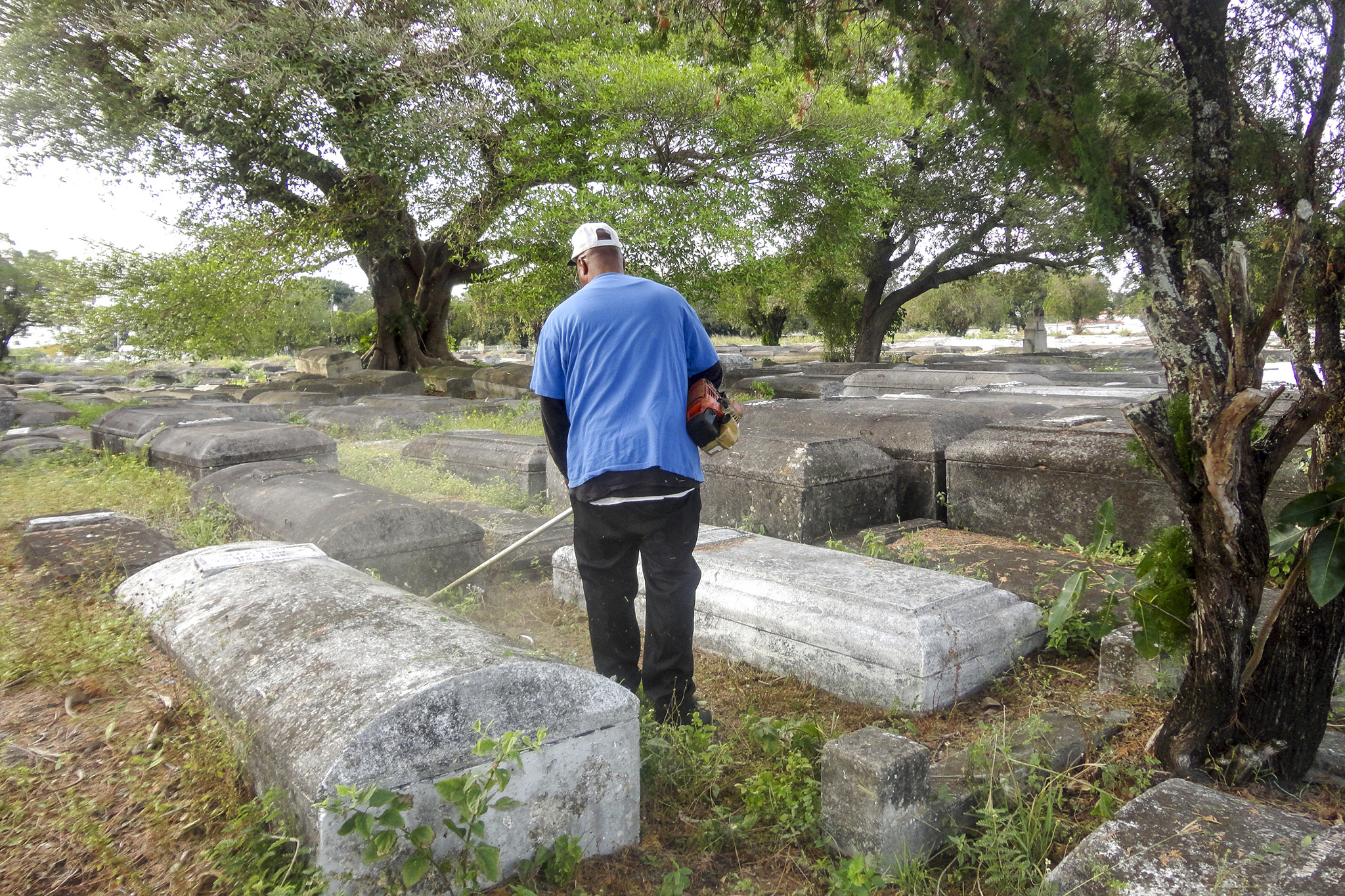
Theodore Cochran is one of the family members helping Frank Wooden and his brother, Jessie Wooden, restore the historic Black cemetery called Lincoln Memorial Park. Jan. 2, 2024.
VICTORIA FONSECA / NEXTGENRADIO
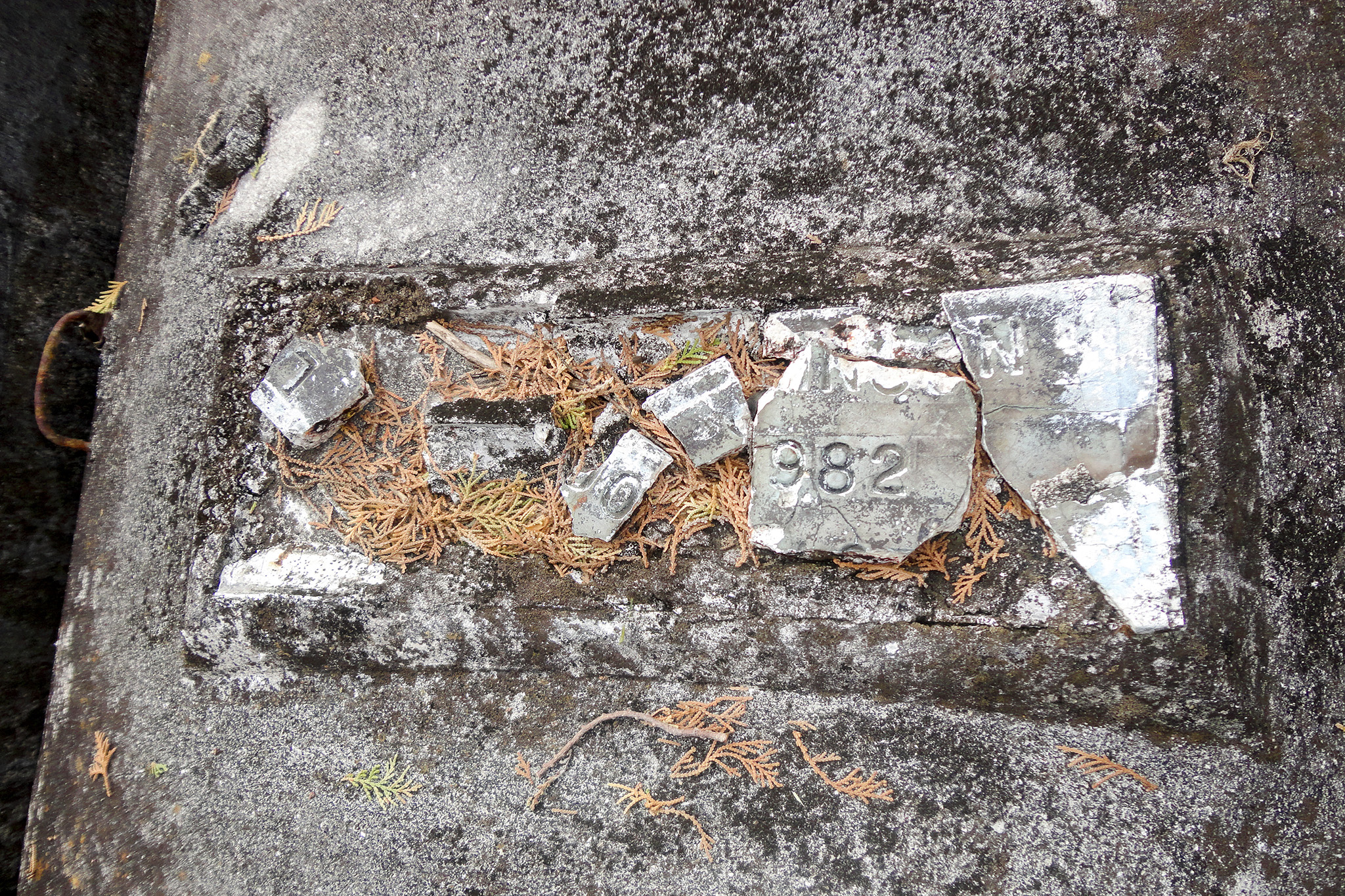
Some of the gravesites at the Lincoln Memorial Park are in such disrepair that it’s hard for family members to find where their loved ones are buried. Jan. 2, 2024.
VICTORIA FONSECA / NEXTGENRADIO
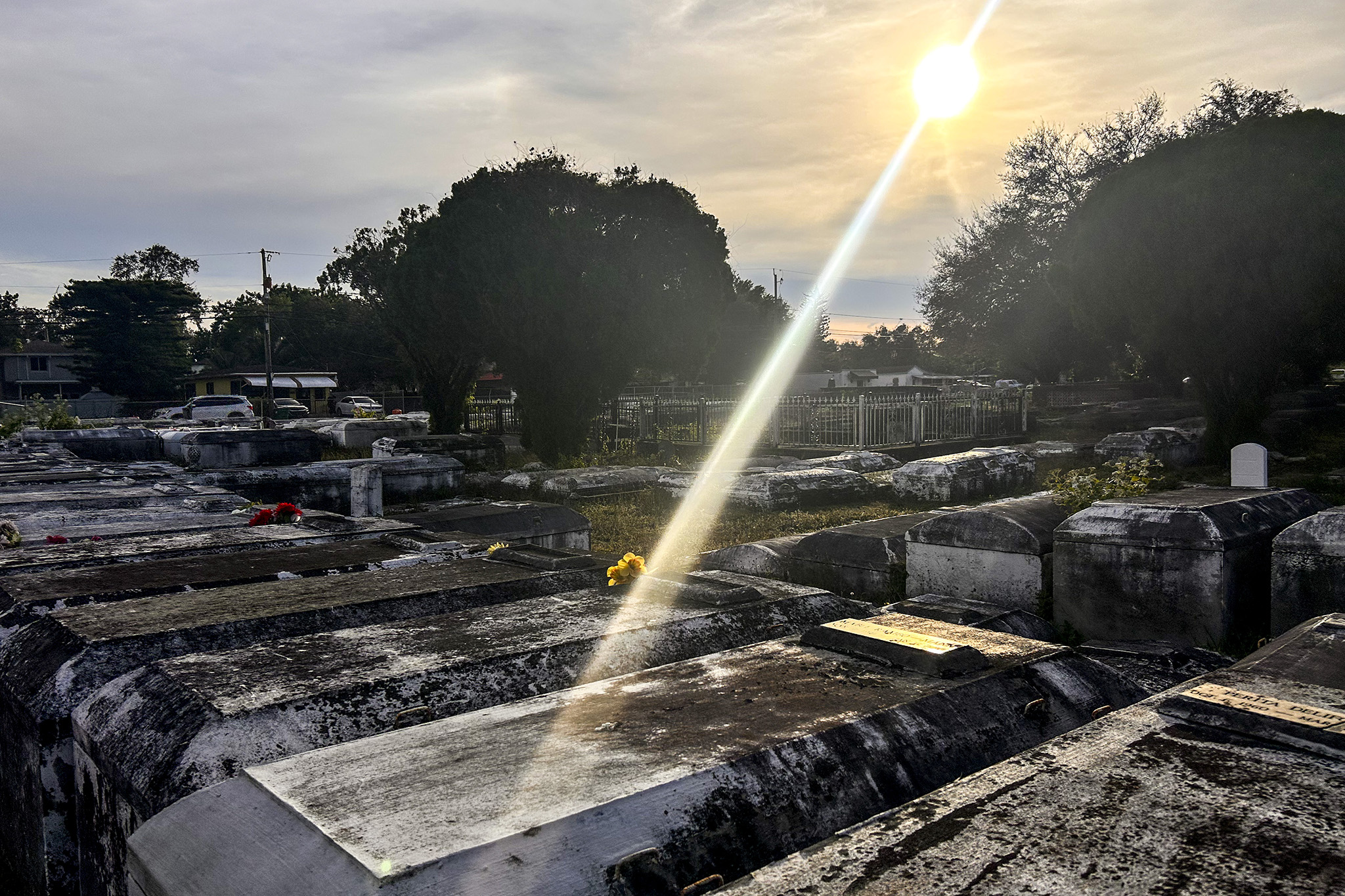
As the sun sets, the graveyard shines with some tombs with flowers provided by the families of the deceased. Jan. 2, 2024.
VICTORIA FONSECA / NEXTGENRADIO
We’re trying to bring the history back to the neighborhood and to the public.
